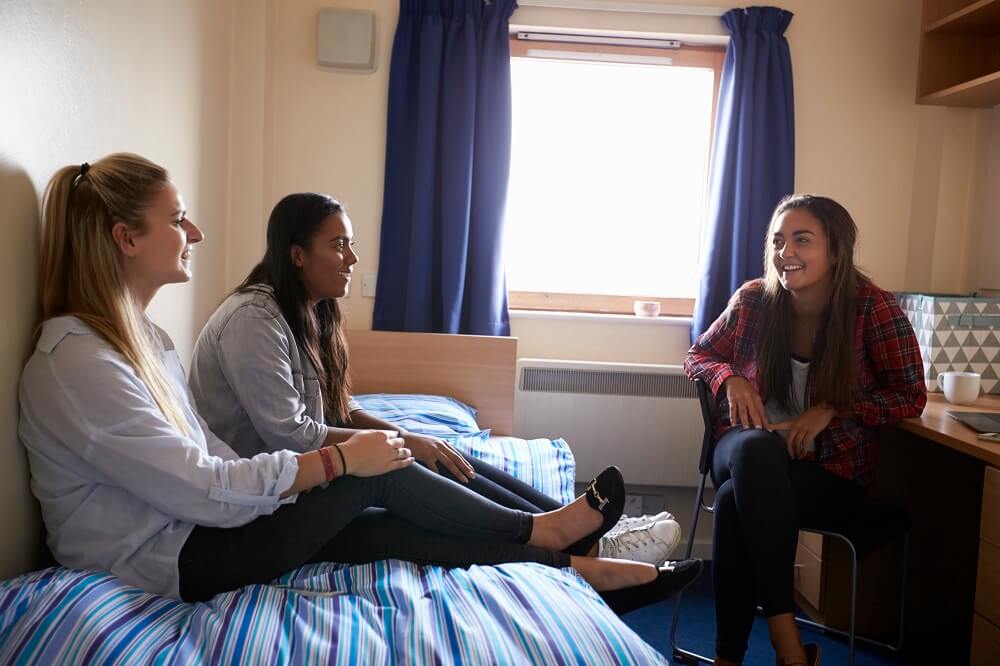International students should ensure that they have adequate housing when arriving at university. If you aren’t sure where to begin, finding a place close to school, affordable, and that suits your needs can seem daunting. This article will discuss four options for accommodation for international students coming to Canada. It also explains how to start searching for the right place.
On-campus housing options for international students coming to Canada to study may be less than in previous years. COVID-19 will see many shared dorms converted to single dorms or shut down altogether, significantly decreasing the student population. If you’re willing to search, many other housing options are available for international students.
Determine your monthly budget
What rent does a student pay in Canada per month?
When planning for your accommodation, the first thing you need to decide is how much you can comfortably afford per month. The average rental price in Canada is higher in the largest cities (e.g., Vancouver, Toronto, Montreal, and other large Canadian cities tend to have higher average rental prices than smaller towns and cities. Renting prices for a room in shared accommodation (house, apartment, student housing) is around $700 to CAD 1,000 per month. You can expect to pay more than $1,200 per month if you plan to live alone in a studio apartment or one-bedroom apartment. You should include utilities, transport, and furniture in your budget.
International students can live on-campus.
Many post-secondary institutions offer student residences that are furnished with basic furniture. International students can take advantage of this option to live within walking distance of their classes. On-campus housing can include a shared dining room with a meal plan that is paid for. This will take the stress out of cooking and grocery shopping. Due to COVID-19, these amenities might not be available during the next school year.
Are international students required to live on campus?
International students are not required to live on campus, provided that their program does provide housing. Depending on your university’s policies, international students may be granted priority access to housing on campus.
What kinds of housing are available on campus?
More prominent universities often have several types of student accommodation on campus. Dorm-style rooms are standard in first-year residences. They have shared facilities like bathrooms, dining halls, and common areas. Many universities offer apartment or townhouse residences with up to four bedrooms. These apartments and townhouses are usually reserved for students in the upper years. To find out which housing types are available, visit your university’s website.
How much does on-campus housing cost?
For a minimum of $6,000CAD, you can get an eight-month-long on-campus housing plan and meal plan. Smaller universities, such as St. Francis Xavier), up to CAD 14,000 (University of British Columbia) or CAD 16,000 (University of Toronto). For information on the cost of housing on campus, contact your university.
When should I apply to live on campus?
Many universities highly seek on-campus housing due to its central location. To apply, contact your university’s student housing department as soon as you receive your acceptance letter. A fee may be required for some applications.
International students can enjoy the benefits of living on campus.
- Near classes
- Nearby amenities on campus (Bibliotheque, gyms, and so forth). )
- International student community
- The average rent price includes utilities and food
- 24/7 student housing support in most universities
If students plan to live in a shared residence, they may be able to self-quarantine. If you arrive from outside Canada, you must quarantine for 14 days. To find out if this option is available, contact your university’s International Students’ Department or Housing Department.
Off-campus housing for apartments, houses, and other
For personal reasons, you may opt to live off-campus. You can also explore your city outside your university’s campus by moving to a new area.
The most popular off-campus rentals are shared apartments, one-bedroom apartments, and shared houses. Students usually sign a one-year lease in May or September. This includes the summer term. Depending on where you live, you may need to pay your first month’s rent, last month’s rent, or a security deposit. If it hasn’t been damaged, this is half of the rent you’ll receive at the end of your lease.
Additional costs might not be included in the advertised rental cost. You should check if utilities such as electricity, water, wifi, and heating are included in the advertised rental price. Before you sign the lease, make sure you check to see if utilities (e.g.
Tip: Subletting refers to temporarily renting out a room you have leased. Students often sublet their rooms, which is expected. However, it can pose a risk to your landlord if they don’t pay rent or cause damage to the property. You should check with your landlord if you plan to return home in the summer.
International students can enjoy off-campus housing benefits:
- There are many options for style and location when it comes to housing.
- Students can save money by choosing cheaper accommodation.
You can choose your roommates.
- Get familiar with everyday Canadian life outside of campus. Enjoy more freedom and independence in your daily life (cook, shop, and cook for yourself).
Where can I find off-campus housing?
Start looking for an apartment/room on Padmapper or Rentals.ca. You can also search Craigslist, Kijiji, and Facebook Marketplace. A search on Facebook may be sufficient to locate student housing groups at particular universities. You can also search on Facebook for “Student housing in the University of Toronto” or your university’s international student department. You may be able to find a roommate if you know someone who lives in the same area as you.
Tips:
Avoid scams and misrepresented listings when you are looking for online listings.
- Avoid “too-good-to-be-true” deals listed far lower than the market price.
- Requesting a video chat tour of the listing will allow you to meet the potential landlord and screen the listing.
- Don’t send money to anyone if you aren’t sure the listing is genuine.
- Don’t give out personal information to potential landlords.
Planning your commute
When looking for an apartment off-campus, it is important to consider transportation and location. It may be possible to drive, take transit, cycle, or walk to campus. Students who live in large cities typically commute for ten minutes to an hour. If your commute is more than an hour, it may be worth looking into other options. Consider how much snow or rain your area receives in winter. This could affect your commute times.
Plan your commute if you know that you will be traveling longer to save time studying. Students who commute to school often schedule their classes on one or two days per week instead of driving all day.
All things about public transit:
Are you planning to use transit to get to campus? You should be familiar with public transport in these major cities: Toronto and Vancouver, Montreal, Calgary and Edmonton, Ottawa, and Ottawa Winnipeg.
Rocketman, a Canadian-built app for transit, allows you to track your bus and train along its route, find out when it is coming, save stops you like, and receive transit delays alerts in real-time. Rocketman is available for free today.
Staying in a homestay with your host family
What’s a homestay?
A homestay, which is an alternative to off-campus rentals, allows students to live in the home of a host family. You will usually receive 1-3 meals per day. It may be helpful for you to have your host family introduce you to the area and help you feel at home away from school. While homestays are more expensive, you’ll have more time to study and do more because most cooking and cleaning are done.
Where can I find a place to stay
These homestay networks are designed for host families with specific criteria. You can feel secure and confident in your placement, and you can receive assistance at any time:
What is the cost of a Canadian homestay?
The Canada Homestay Network estimates that a homestay costs between $600 to CAD 1000 per month, depending on the number of meals and amenities. You may be charged per night rather than per month.
Exchange hours for room or board
International students can arrange with families to exchange services (such as cleaning or animal care) for room and board. You can find this arrangement on classified websites such as Craigslist or Kijiji. You can arrange a meeting in person or a video call with your host to meet them before you move in. There may be a written contract or an informal, unwritten agreement. Be cautious when you contact online listings.
Short-term furnished rentals
What’s a short-term rental?
Short-term rentals can be rented for shorter periods than long-term apartment rentals. They are usually available for a few days up to a whole four-month period.
Where can you find short-term furnished rental homes?
You can find short-term rentals on Airbnb, Vrbo, and Sublet.com. Be cautious when listing your short-term rental property online. Many rental websites will allow you to view reviews from the host to make sure they are genuine.
Short-term rentals: How to make international students more successful
Short-term furnished rentals are a great option if you don’t have the funds to rent a long-term place to live during your search for a new home. To get to know the area, its businesses, and transport options, it is a brilliant idea to rent a short-term apartment in or close to where you plan to live.



